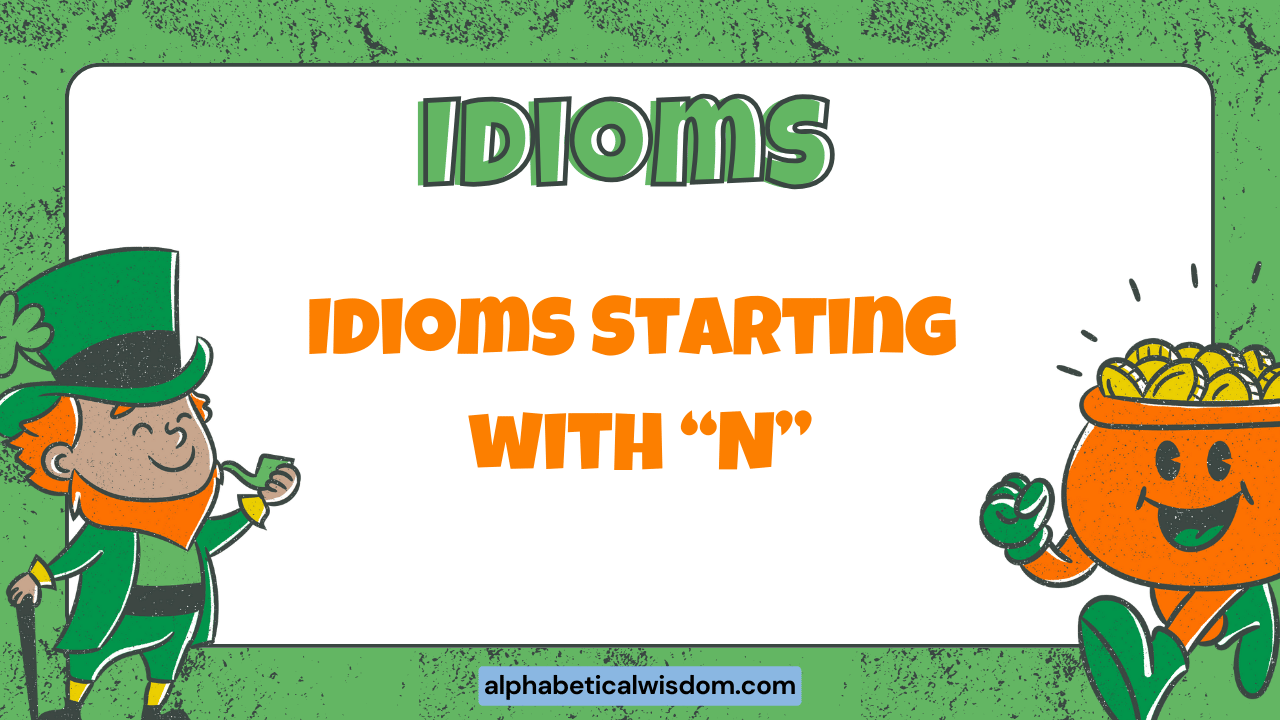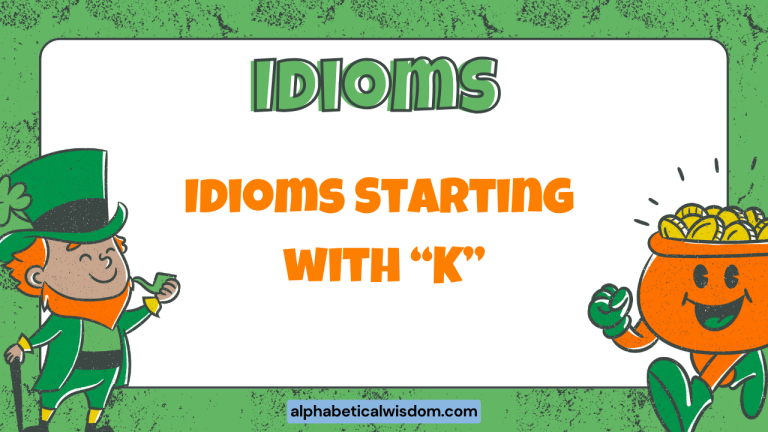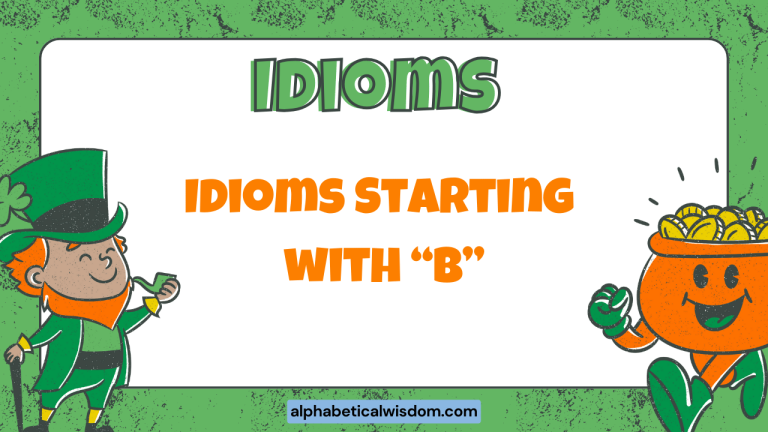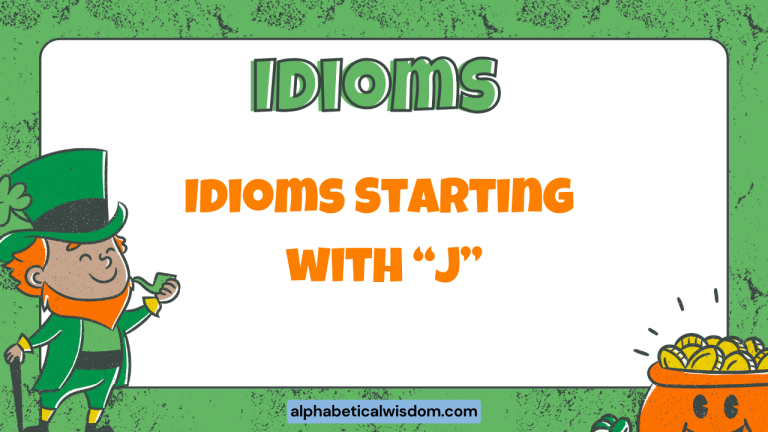Navigating ‘N’ Idioms: A Comprehensive English Guide
Idioms are the colorful threads that weave through the tapestry of the English language, adding depth, nuance, and personality to our conversations and writing. Mastering idioms, particularly those starting with the letter ‘N,’ is crucial for anyone seeking fluency and a deeper understanding of English.
These expressions, often defying literal interpretation, unlock a world of cultural context and linguistic richness. This guide is designed for English language learners of all levels, from beginners to advanced speakers, who wish to enhance their vocabulary, improve their comprehension, and communicate more effectively and idiomatically.
By exploring the meanings, origins, and usage of ‘N’ idioms, you’ll gain invaluable insights into the subtleties of the English language.
This article provides a structured approach to learning idioms starting with ‘N,’ offering clear definitions, practical examples, usage rules, and practice exercises. Whether you’re a student preparing for an exam, a professional aiming to improve your communication skills, or simply an enthusiast eager to expand your linguistic horizons, this guide will equip you with the knowledge and tools you need to confidently navigate the world of English idioms.
Embrace the challenge, and let’s embark on this enriching journey together!
Table of Contents
- Introduction
- Definition of Idioms
- Structural Breakdown of Idioms
- Types and Categories of Idioms
- Examples of Idioms Starting with ‘N’
- Usage Rules for Idioms
- Common Mistakes with Idioms
- Practice Exercises
- Advanced Topics in Idiom Usage
- Frequently Asked Questions
- Conclusion
Definition of Idioms
An idiom is a phrase or expression whose meaning cannot be understood from the ordinary meanings of the words within it. It’s a linguistic shortcut, a cultural reference point, and often a colorful way to express a concept. Idioms are integral to mastering any language, including English. They add richness, depth, and nuance to communication, making it more engaging and authentic.
Idioms can be classified based on their function, such as describing emotions, situations, or actions. They operate on a figurative level, requiring the listener or reader to understand the intended meaning rather than interpreting the words literally.
For example, the idiom “needle in a haystack” doesn’t refer to a literal needle and haystack; it signifies something that is extremely difficult to find.
The context in which an idiom is used is crucial for understanding its meaning. The same idiom can have slightly different connotations depending on the situation and the speaker’s intention.
Therefore, familiarity with various idioms and their appropriate contexts is essential for effective communication in English.
Structural Breakdown of Idioms
Idioms, while seemingly simple, often have complex structural underpinnings. They can range from simple phrases to more elaborate clauses.
Understanding their structure helps in recognizing and using them correctly. Many idioms follow specific grammatical patterns, even though their overall meaning is non-literal.
The structure might involve a verb and a preposition, a noun and an adjective, or even a complete sentence.
The key characteristic of an idiom’s structure is its non-compositionality. This means that the meaning of the whole phrase is not simply the sum of the meanings of its individual parts. For instance, “nip it in the bud” doesn’t literally involve nipping anything; it means to stop something at an early stage. The structure of an idiom contributes to its memorability and its impact on the listener or reader.
Furthermore, some idioms can be modified slightly without losing their idiomatic meaning, while others are fixed and cannot be altered. For example, you can say “bury the hatchet” or “bury your hatchet,” but you can’t significantly change the wording without losing the idiom’s impact.
Recognizing this flexibility (or lack thereof) is crucial for using idioms effectively.
Types and Categories of Idioms
Idioms can be categorized in various ways, such as by their origin, their grammatical structure, or their semantic function. Here are a few common categories:
Semantic Categories
This classification is based on the meaning or concept that the idiom conveys. Examples include idioms related to emotions (e.g., “on cloud nine”), situations (e.g., “between a rock and a hard place”), or actions (e.g., “beat around the bush”).
Semantic categories help learners group idioms by their general meaning, making them easier to remember and use.
Structural Categories
This classification is based on the grammatical structure of the idiom. Examples include phrasal verb idioms (e.g., “break down”), prepositional phrase idioms (e.g., “in the nick of time”), and clausal idioms (e.g., “it’s raining cats and dogs”).
Understanding the structural category can help learners identify the grammatical components of the idiom.
Origin-Based Categories
This classification is based on the historical or cultural origin of the idiom. Examples include idioms with nautical origins (e.g., “know the ropes”), idioms with literary origins (e.g., “all that glitters is not gold”), and idioms with historical origins (e.g., “crossing the Rubicon”).
Knowing the origin of an idiom can provide valuable context and enhance understanding of its meaning.
Examples of Idioms Starting with ‘N’
This section provides a comprehensive list of idioms starting with the letter ‘N,’ categorized by their thematic similarities. Understanding these idioms and their contexts will greatly improve your comprehension and communication skills.
Nature-Related Idioms
These idioms draw inspiration from the natural world, using elements like weather, plants, and animals to convey figurative meanings.
The following table provides examples of nature-related idioms starting with ‘N’, along with their meanings and example sentences.
| Idiom | Meaning | Example Sentence |
|---|---|---|
| Nature calls | The need to urinate or defecate | I’ll be right back, nature calls. |
| Needle in a haystack | Something extremely difficult to find | Finding the right information in that report was like looking for a needle in a haystack. |
| Nest egg | Savings accumulated for future use | They’ve been saving for years to build a substantial nest egg for their retirement. |
| New lease on life | A renewed sense of vitality or purpose | After recovering from his illness, he felt like he had a new lease on life. |
| Nip something in the bud | To stop something at an early stage before it develops | We need to nip these rumors in the bud before they spread further. |
| Nine times out of ten | Almost always; very likely | Nine times out of ten, the train is late during rush hour. |
| No bed of roses | Not easy or pleasant; difficult | Being a single parent is no bed of roses. |
| Not see the forest for the trees | To be so focused on the details that one misses the bigger picture | He’s so caught up in the minor issues that he can’t see the forest for the trees. |
| Not a cloud in the sky | Clear weather; no problems in sight | The meeting went smoothly; there wasn’t a cloud in the sky. |
| Not out of the woods yet | Still facing difficulties or danger | The patient is recovering, but he’s not out of the woods yet. |
| Nurture nature | To care for and protect the environment | It’s important to nurture nature for future generations. |
| Native as the night | Very connected to one’s origins or homeland. | She felt as native as the night whenever she returned to her hometown. |
| Nature’s way | The natural process of life and death. | The old tree fell in the storm; it was just nature’s way. |
| Needle in a bundle of needles | Something difficult to find amidst similar items. | Finding the exact file he needed was like searching for a needle in a bundle of needles. |
| Never a rose without thorns | There’s always something negative even in the best things. | The job is great, but the long hours are a downside; there’s never a rose without thorns. |
| New blood | New people or ideas that bring energy and innovation. | The company needs some new blood to revitalize its strategies. |
| Night owl | A person who stays up late and is active at night. | He’s a night owl; he does his best work after midnight. |
| No spring chicken | Not young anymore; getting old. | He may be experienced, but he’s no spring chicken. |
| Nourish the roots | To support and strengthen the foundation of something. | We need to nourish the roots of our community by supporting local businesses. |
| Never look a gift horse in the mouth | Don’t be critical or unappreciative when someone offers you a gift or favor. | They offered us a free upgrade, and we weren’t about to look a gift horse in the mouth. |
| Neither fish nor fowl | Belonging to no definite category; ambiguous. | The project was neither fish nor fowl; it didn’t fit into any department. |
| Not know beans | To know nothing about something. | He doesn’t know beans about computers. |
Number-Related Idioms
These idioms incorporate numbers to express quantities, probabilities, or specific situations.
The following table provides examples of number-related idioms starting with ‘N’, along with their meanings and example sentences.
| Idiom | Meaning | Example Sentence |
|---|---|---|
| Name of the game | The most important aspect or goal. | In business, making a profit is the name of the game. |
| Near miss | An event that almost resulted in an accident or disaster. | The plane had a near miss with another aircraft. |
| Need something like a hole in the head | To not need something at all; to find something burdensome. | I need more work like I need a hole in the head. |
| Never in a month of Sundays | Never; not at all. | He’ll never agree to that proposal in a month of Sundays. |
| New kid on the block | Someone who is new to a place or activity. | He’s the new kid on the block in the sales department. |
| Nine-to-five | A standard working day; a regular job. | She works a nine-to-five job in an office. |
| No dice | No; not allowed; unsuccessful. | I asked for a raise, but it was no dice. |
| No harm, no foul | No damage or offense was done, so there is no problem. | I accidentally bumped into him, but no harm, no foul. |
| No skin off my nose | It doesn’t affect me; it’s not my problem. | If he wants to quit, it’s no skin off my nose. |
| No strings attached | Without any special conditions or requirements. | The offer comes with no strings attached. |
| Not born yesterday | Not naive or easily fooled. | He tried to trick me, but I wasn’t born yesterday. |
| Not by a long shot | Not at all; certainly not. | Are we finished yet? Not by a long shot. |
| Not for love nor money | Not for any reason; under no circumstances. | I wouldn’t do that job for love nor money. |
| Not half bad | Quite good; decent. | The food at the new restaurant was not half bad. |
| Not on your life | Definitely not; never. | Would I jump off a cliff? Not on your life! |
| Number one | Oneself; the most important person. | You have to look out for number one. |
| Nth degree | To the greatest extent. | He was loyal to the nth degree. |
| Name is mud | To be in disgrace or disfavor. | If he fails to deliver, his name will be mud. |
| Never say die | Never give up; keep trying. | Even when things get tough, never say die. |
| No-brainer | Something that requires little or no thought. | Accepting the job offer was a no-brainer. |
| Not a shadow of a doubt | No doubt at all; completely certain. | I have not a shadow of a doubt that she’ll succeed. |
| Now you’re talking | I agree with you; that’s a good idea. | “Let’s order pizza.” “Now you’re talking!” |
Negative Connotation Idioms
These idioms express negative feelings, situations, or outcomes.
The following table provides examples of negative connotation idioms starting with ‘N’, along with their meanings and example sentences.
| Idiom | Meaning | Example Sentence |
|---|---|---|
| Nail in the coffin | An action that contributes to the failure of something | His constant mistakes were the final nail in the coffin for the project. |
| Nasty piece of work | An unpleasant or malicious person | He’s a nasty piece of work; I wouldn’t trust him. |
| Nerves of steel | Exceptional courage and composure | The pilot had nerves of steel during the emergency landing. |
| No laughing matter | A serious issue; not something to be joked about | The accident was no laughing matter; someone could have been seriously hurt. |
| Not worth a dime | Worthless; of no value | His advice isn’t worth a dime; he doesn’t know what he’s talking about. |
| Nowhere to turn | Having no one to ask for help or support | After losing his job and his home, he felt like he had nowhere to turn. |
| Nosedive | To decline rapidly; to plummet | The company’s profits took a nosedive after the scandal. |
| Not give a nickel | To not care at all about something | He doesn’t give a nickel about what others think of him. |
| Nuke from orbit | To use extreme measures to solve a problem | The situation was so bad, they decided to nuke it from orbit. |
| Nary a word | Not a single word | She left the room, nary a word spoken. |
| Near the knuckle | Borderline offensive or inappropriate | His jokes were a bit near the knuckle for a formal event. |
| Never darken my doorstep again | Don’t ever come back | After the argument, she told him to never darken her doorstep again. |
| No love lost | To dislike each other | There’s no love lost between them; they’ve been enemies for years. |
| Not a pretty picture | An unpleasant or undesirable situation | The financial forecast is not a pretty picture. |
| Not add up | To not make sense; to be illogical | His story doesn’t add up; I think he’s lying. |
| Not have a leg to stand on | To have no valid defense or argument | He doesn’t have a leg to stand on in this case. |
| Nothing to write home about | Unremarkable; not worth mentioning | The movie was nothing to write home about. |
| Nip in the butt | To stop something before it gets out of control. | We need to nip this problem in the butt before it gets worse. |
| Nose out of joint | Offended or upset. | He got his nose out of joint when he wasn’t invited to the party. |
| Not mince words | To speak directly and frankly, even if it’s unpleasant. | She didn’t mince words when she told him he was wrong. |
| Nervous wreck | A person who is extremely anxious or stressed. | Before the presentation, she was a nervous wreck. |
Nautical Idioms
These idioms originate from seafaring contexts and often relate to navigation, ships, or the ocean.
The following table provides examples of nautical idioms starting with ‘N’, along with their meanings and example sentences.
| Idiom | Meaning | Example Sentence |
|---|---|---|
| Navigate the waters | To deal with a complicated or difficult situation carefully. | She’s skilled at navigating the political waters of the company. |
| Near the wind | Close to the limit of safety or legality. | The company’s financial practices were sailing near the wind. |
| No one at the helm | No one in charge; lacking leadership. | With the CEO absent, there was no one at the helm. |
| Nautical mile | A unit of measurement used at sea, approximately 1.15 statute miles. | The island is about 50 nautical miles from the coast. |
| Never miss the boat | To not miss an opportunity. | He’s always eager to seize new opportunities and never misses the boat. |
| Nail your colors to the mast | To publicly declare your beliefs and refuse to change them, even if it’s unpopular. | He nailed his colors to the mast and defended his principles. |
| Nudge the rudder | To make small adjustments to influence the direction of something. | He nudged the rudder of the project to ensure it stayed on course. |
Usage Rules for Idioms
Using idioms correctly requires attention to several key rules. First, it’s essential to understand the idiom’s meaning accurately.
Misinterpreting an idiom can lead to confusion or miscommunication. Always look up the idiom in a reliable dictionary or idiom resource if you’re unsure of its meaning.
Second, consider the context. Idioms are often informal and may not be appropriate in formal settings.
Using an idiom in the wrong context can sound awkward or out of place. Choose idioms that are appropriate for the audience, the topic, and the overall tone of the communication.
Third, be aware of regional variations. Some idioms are more common in certain regions or countries than others.
Using an idiom that is unfamiliar to your audience can be confusing. If you’re communicating with people from different regions, it’s best to use idioms that are widely understood.
Fourth, avoid overusing idioms. While idioms can add color and personality to your language, using too many can make your speech sound artificial or contrived.
Use idioms sparingly and strategically, choosing those that best convey your intended meaning.
Common Mistakes with Idioms
One common mistake is taking idioms literally. Because idioms have figurative meanings, interpreting them literally can lead to misunderstandings.
For example, someone might think “break a leg” is wishing harm, instead of wishing good luck.
Another mistake is using the wrong form of an idiom. Many idioms have a fixed structure, and changing the words or grammar can alter the meaning or make the idiom nonsensical.
For instance, saying “nip it at the bud” instead of “nip it in the bud” changes the meaning and sounds incorrect.
A further mistake is using idioms inappropriately in formal contexts. Idioms are generally informal and may not be suitable for academic writing or professional presentations.
Using overly casual language in a formal setting can undermine your credibility.
The following table illustrates common mistakes with idioms and provides the correct usage.
| Incorrect | Correct | Explanation |
|---|---|---|
| Needle on a haystack | Needle in a haystack | The correct preposition is “in,” not “on.” |
| Nip it at the bud | Nip it in the bud | The correct preposition is “in,” not “at.” |
| Not see the trees for the forest | Not see the forest for the trees | The words “forest” and “trees” are reversed in the incorrect version. |
| New kid at the block | New kid on the block | The correct preposition is “on,” not “at.” |
Practice Exercises
Test your understanding of idioms starting with ‘N’ with these practice exercises. Fill in the blanks with the correct idiom from the list provided.
Idiom list: needle in a haystack, nip it in the bud, nine times out of ten, no bed of roses, not out of the woods yet, nature calls, nest egg, new lease on life, name of the game, near miss
| Question | Answer |
|---|---|
| 1. Saving for retirement is important to build a substantial __________. | nest egg |
| 2. Finding the missing file in the disorganized office was like looking for a __________. | needle in a haystack |
| 3. The doctor said the patient is recovering, but he’s __________. | not out of the woods yet |
| 4. Being a caregiver is __________, but it’s rewarding. | no bed of roses |
| 5. We need to __________ before it becomes a bigger problem. | nip it in the bud |
| 6. __________, the train is delayed during the morning commute. | Nine times out of ten |
| 7. After surviving the accident, he felt like he had a __________. | new lease on life |
| 8. I have to go; __________. | nature calls |
| 9. Avoiding risks and maximizing profits is the __________. | name of the game |
| 10. The plane had a __________ with another aircraft, but they avoided a collision. | near miss |
Exercise 2: Choose the correct meaning of the idiom in the sentence.
| Question | Options | Answer |
|---|---|---|
| 1. He’s the new kid on the block in the sales department. | (a) He’s a child. (b) He’s new to the job. (c) He lives nearby. | (b) He’s new to the job. |
| 2. The company’s profits took a nosedive after the scandal. | (a) Profits increased. (b) Profits remained stable. (c) Profits declined rapidly. | (c) Profits declined rapidly. |
| 3. If he fails to deliver, his name will be mud. | (a) He will be praised. (b) He will be in disgrace. (c) He will be promoted. | (b) He will be in disgrace. |
| 4. He doesn’t know beans about computers. | (a) He knows a lot. (b) He knows a little. (c) He knows nothing. | (c) He knows nothing. |
| 5. We weren’t about to look a gift horse in the mouth. | (a) Be unappreciative. (b) Be grateful. (c) Be indifferent. | (a) Be unappreciative. |
| 6. They offered a deal with no strings attached. | (a) Many conditions. (b) No conditions. (c) Few conditions. | (b) No conditions. |
| 7. He has nerves of steel. | (a) Easily frightened. (b) Very brave. (c) Anxious. | (b) Very brave. |
| 8. It was a no-brainer decision. | (a) Difficult choice. (b) Easy choice. (c) No choice. | (b) Easy choice. |
| 9. She didn’t mince words. | (a) Spoke kindly. (b) Spoke directly. (c) Spoke indirectly. | (b) Spoke directly. |
| 10. We need new blood in the company. | (a) More funding. (b) New people. (c) New rules. | (b) New people. |
Advanced Topics in Idiom Usage
For advanced learners, understanding the nuances of idiom usage is crucial. This includes recognizing how idioms can be manipulated for rhetorical effect, such as through irony or satire.
For example, someone might use an idiom sarcastically to convey the opposite of its literal meaning.
Another advanced topic is the study of idiom etymology, which involves tracing the origins and historical development of idioms. Understanding the etymology of an idiom can provide valuable insights into its meaning and usage.
For instance, knowing that the idiom “bury the hatchet” comes from a Native American tradition adds depth to its understanding.
Furthermore, advanced learners should be aware of the cultural context of idioms. Idioms are often deeply rooted in cultural traditions and beliefs, and understanding these cultural connections can enhance comprehension and communication.
For example, some idioms may be specific to certain cultures or subcultures, and using them appropriately requires sensitivity and awareness.
Frequently Asked Questions
- What is the difference between an idiom and a proverb?
An idiom is a phrase whose meaning is not predictable from the usual meanings of its constituent elements (e.g., “kick the bucket”). A proverb is a short, popular saying that expresses a common truth or belief (e.g., “actions speak louder than words”). Idioms are more figurative and less didactic than proverbs.
- Why are idioms so difficult to learn?
Idioms are challenging because their meanings are not literal and often culturally specific. They require learners to understand the figurative language and the cultural context in which they are used. Memorization alone is not sufficient; understanding the nuances of usage is key.
- How can I improve my understanding of idioms?
Immerse yourself in the language by reading books, watching movies, and listening to native speakers. Pay attention to how idioms are used in context and look up any unfamiliar expressions. Practice using idioms in your own writing and speaking to reinforce your learning.
- Are idioms used in formal writing?
Generally, idioms are more common in informal speech and writing. Formal writing typically requires more precise and direct language. However, some idioms may be appropriate in certain formal contexts if they are widely understood and contribute to the clarity or impact of the message.
- Can I create my own idioms?
While it’s possible to create new expressions, they are not considered idioms until they gain widespread acceptance and usage. Idioms are typically established phrases with conventional meanings. Creating your own expressions may lead to confusion if they are not understood by others.
- How do I know when to use an idiom?
Consider your audience, the context, and the tone of your communication. Idioms are most appropriate in informal settings and when you want to add color and personality to your language. Avoid using idioms if you are unsure of their meaning or if they may be confusing to your audience.
- Are idioms the same in all English-speaking countries?
No, idioms can vary significantly between different English-speaking countries and regions. Some idioms are specific to certain cultures or subcultures. Be aware of these regional variations and use idioms that are appropriate for your audience.
- What resources can I use to learn more idioms?
There are many excellent resources available, including idiom dictionaries, online idiom websites, and language learning apps. Look for resources that provide clear definitions, example sentences, and audio pronunciations. Also, consider joining a language exchange group or working with a tutor to get personalized feedback on your idiom usage.
- Is it okay to translate idioms directly from my native language?
No, direct translation of idioms is rarely successful, as the figurative meanings and cultural contexts often differ significantly between languages. It’s best to learn the English idioms directly and understand their specific meanings and usages.
- How do I avoid misusing idioms?
Pay close attention to the context and the intended meaning. Double-check the idiom’s definition and usage in a reliable dictionary or idiom resource. Practice using the idiom in different sentences and ask native speakers for feedback on your usage. Also, be aware of common mistakes and avoid using idioms if you are unsure of their meaning or appropriateness.
Conclusion
Mastering idioms starting with the letter ‘N’ is a rewarding journey that enhances your understanding and use of the English language. We’ve explored the definition, structure, types, and usage rules of these colorful expressions.
By studying the examples provided and practicing the exercises, you can confidently incorporate ‘N’ idioms into your everyday communication.
Remember that idioms are more than just words; they are cultural snapshots that reflect the history, values, and beliefs of English-speaking societies. Embrace the challenge of learning idioms and continue to expand your vocabulary and linguistic skills.
With dedication and practice, you’ll unlock a new level of fluency and expressiveness in English.
Continue to immerse yourself in English language media, engage in conversations with native speakers, and seek opportunities to use idioms in context. The more you practice, the more natural and effortless your idiom usage will become.
Happy learning!






